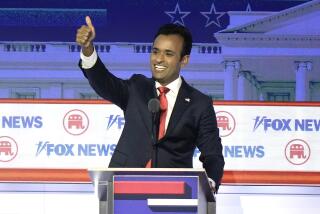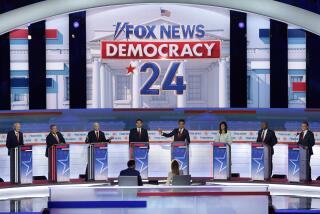Distortions, Exaggerations Cited : Truth Sometimes Suffered in Bentsen-Quayle Debate
- Share via
WASHINGTON — As often happens in a heated political debate, the truth was sometimes lost or obscured during Wednesday’s televised confrontation between Democratic vice presidential nominee Lloyd Bentsen and his GOP counterpart, Dan Quayle.
Quayle, focusing on Democratic presidential nominee Michael S. Dukakis, sometimes misstated the Massachusetts governor’s record while overstating his own achievements.
Likewise, Bentsen demonstrated a strong tendency to exaggerate the failures of the Reagan-Bush Administration. Following are some of the subjects on which discrepancies emerged.
MASSACHUSETTS
Debate: Quayle charged that Dukakis had raised taxes five times in Massachusetts. Bentsen claimed that Dukakis had lowered the tax burden in his state from one of the highest in the country to one of the lowest.
Facts: Shortly after taking office for the first time in 1975, Dukakis supported a large income tax surcharge and other tax increases, arguing that he had to abandon his no-tax-hike campaign pledge because of fiscal problems inherited from a Republican predecessor.
To help balance the state’s budget this year, Dukakis signed another measure raising taxes by $180 million. Dukakis supported two other tax increases that were rejected by the state Legislature.
On the other side of the ledger, Dukakis supported business and personal tax cuts totaling more than $500 million since 1983. The overall tax burden in Massachusetts is a more complex matter, partly because of a property tax reduction that Dukakis opposed. The Dukakis campaign points out that the tax “revenue” burden in the state has gone from 16th in the nation to 35th. The Bush campaign cites evidence that “total state taxes,” computed as a percentage of personal income, have increased, moving the state from 18th in the nation on that score to 13th.
THE BUDGET
Debate: Quayle charged that Bentsen had voted against the original Gramm-Rudman law aimed at eliminating the federal deficit within five years.
Facts: On a key vote in October, 1985, Bentsen supported Gramm-Rudman. But he had voted earlier in favor of a competing measure sponsored by Senate Democrats and later voted against a debt bill that included the Gramm-Rudman provision. After the Supreme Court threw out the Gramm-Rudman measure, Bentsen was chairman of a conference committee that produced the new version of Gramm-Rudman last year.
QUAYLE’S RECORD
Debate: Quayle claimed that he went to Geneva “many times” during the talks on the U.S.-Soviet medium-range missile treaty and said he had met British Prime Minister Margaret Thatcher and West German Chancellor Helmut Kohl. “I know them; they know me.”
Fact: The visitors’ schedule kept by U.S. officials in Geneva lists only one visit by Quayle during the INF talks, the Associated Press reported. Quayle’s office recalls that the senator met Kohl at a dinner in Munich and attended a dinner with Thatcher in Washington.
FOREIGN INVESTMENT
Debate: Bentsen charged that the United States has become the world’s largest debtor nation and is losing its economic independence and said foreigners have bought 10% of the manufacturing base and own 46% of the commercial real estate in Los Angeles. Quayle said foreign investment is a sign of confidence in the U.S. economy and adds jobs.
Facts: Experts differ over the impact of foreign investment in the United States, with some supporting Bentsen’s argument and others defending Quayle’s. The United States is not a large debtor nation in the same way that such Third World nations as Mexico and Brazil are. That is because U.S. foreign obligations are in its own currency and because American investment abroad, at current values, probably still exceeds foreign investment in the United States.
On the specific facts, an estimated 5.7% of the manufacturing assets are owned by foreign companies, according to Commerce Department statistics. Other figures compiled by private sources, however, contend that firms headquartered abroad control about 9.5% of U.S. manufacturing. Foreigners own about 46% of the commercial real estate in downtown Los Angeles.
THE ENVIRONMENT
Debate: Quayle claimed to have “a very strong record” in the Senate on environmental issues.
Facts: Thursday, the League of Conservation Voters said Quayle voted with environmentalists on only two of 10 key votes during 1987 and 1988--giving him a poor 20% rating. Bentsen’s record was 40%.
Debate: Quayle blamed Dukakis for allowing Boston Harbor to become “the dirtiest waterway in America” and said the Massachusetts governor had applied for a license to dump Massachusetts sewage off the shore of New Jersey.
Fact: Although Boston Harbor is one of the nation’s dirtiest bodies of water, Dukakis and the Massachusetts Legislature have created a public authority to undertake a $6-billion cleanup. Massachusetts sought, but never received, approval from the Reagan Administration to use a dumping site 106 miles off the New Jersey shore.
More to Read
Get the L.A. Times Politics newsletter
Deeply reported insights into legislation, politics and policy from Sacramento, Washington and beyond. In your inbox twice per week.
You may occasionally receive promotional content from the Los Angeles Times.










